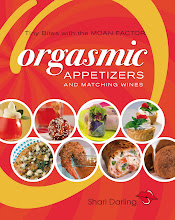
There’s more to the culinary experience than meets the eye, the nose, and the palate. I often discuss the primary building blocks in wine and food and how they work together. And while this gives you the ability to look at the tangible elements in each, there are also more subtle aspects at work.
Let’s pretend, for a moment, that you decide to visit the Niagara Peninsula on a hot, summer day to tour wine country in celebration of your marriage anniversary. For lunch, you and your partner head to the Niagara Escarpment to dine at a winery. While there, you both sample fresh, Canadian cheeses and sip a wonderfully crisp, dry Riesling to refresh your palate. The sun warms your shoulders as you gaze at rolling vineyards that gradually fall to meet Lake Ontario’s shoreline with the Toronto skyline in the distance. Best of all, you are experiencing and sharing these precious moments with your partner on this special, intimate occasion. An experience such as this might very well serve as one of the most memorable anniversaries you and your partner have ever experienced with this particular dry Riesling now becoming your favorite white wine.
A year goes by and on your next anniversary; you decide to relive this incredible wine touring experience with your partner but at home. You head to the local wine and cheese shops to pick up a bottle of the same dry Riesling and a few varieties of Canadian artisan cheese. You arrange the chee se tray, light the candles and await the arrival of your partner from work.
se tray, light the candles and await the arrival of your partner from work.
Let’s pretend, for a moment, that you decide to visit the Niagara Peninsula on a hot, summer day to tour wine country in celebration of your marriage anniversary. For lunch, you and your partner head to the Niagara Escarpment to dine at a winery. While there, you both sample fresh, Canadian cheeses and sip a wonderfully crisp, dry Riesling to refresh your palate. The sun warms your shoulders as you gaze at rolling vineyards that gradually fall to meet Lake Ontario’s shoreline with the Toronto skyline in the distance. Best of all, you are experiencing and sharing these precious moments with your partner on this special, intimate occasion. An experience such as this might very well serve as one of the most memorable anniversaries you and your partner have ever experienced with this particular dry Riesling now becoming your favorite white wine.
A year goes by and on your next anniversary; you decide to relive this incredible wine touring experience with your partner but at home. You head to the local wine and cheese shops to pick up a bottle of the same dry Riesling and a few varieties of Canadian artisan cheese. You arrange the chee
 se tray, light the candles and await the arrival of your partner from work.
se tray, light the candles and await the arrival of your partner from work. Your partner arrives but has forgotten your anniversary and is less than pleasant due to Murphy’s Law and having had to endure a dreadful day. Empathetic, you listen intently. After an hour, you begin to ignore the negativity, intent on recreating that romantic, wine country magic. As you open and pour the wine, you remind your partner that it is your anniversary. Instead of sharing your feelings of romance, your partner bites back with a sarcastic remark and continues about the day from hell. You glare across the table and say nothing as disappointment sets in.
You sip the wine. In shock you look down at your wine glass. This can’t be the wine you enjoyed that winetouring weekend in Niagara! It tastes terribly tart and metallic. You check the label to make sure you didn’t make a mistake, and you wonder if you’ve purchased the wrong vintage or if the wine has spoiled. You even begin to entertain thoughts that this isn’t your REAL partner, but an evil twin.
The wine is no doubt fine. We often fail to realize that many other elements – besides the wine’s building blocks and flavours – directly affect our taste and culinary experience from moment to moment. These elements are:
Our Mood:
Our mood – good or bad, happy or sad – will colour our experience and most certainly our opinion of the wine. Celebratory occasions almost always make any wine taste fabulous. Stress and overwhelm can cause us to ineffectively judge a wine’s character. The reason is that when under stress, our gastrointestinal system becomes acidic. This causes our palate to be acidic, which interacts with the wine’s acid and can cause a metallic taste in our mouth. (Kind of like licking a brass lollypop!)
Climate:
The time of year – the weather -- can also influence our decisions with respect to wine with food. For example, we might enjoy pairing a chilled crisp Sauvignon Blanc with goat cheese and fresh greens on a hot summer day. This wine would be less than delicious after spending a long day on the slopes, skiing. Instead, we might enjoy a glass of Cabernet Sauvignon while lounging by the fireplace to warm our chilly bones.
Environment and Temperature:
Our environment, such as sitting in a crowded, claustrophobic and loud restaurant might taint our experience with both the wine and food. The temperature of our body will also directly affect how we experience a specific wine and food combination.
You sip the wine. In shock you look down at your wine glass. This can’t be the wine you enjoyed that winetouring weekend in Niagara! It tastes terribly tart and metallic. You check the label to make sure you didn’t make a mistake, and you wonder if you’ve purchased the wrong vintage or if the wine has spoiled. You even begin to entertain thoughts that this isn’t your REAL partner, but an evil twin.
The wine is no doubt fine. We often fail to realize that many other elements – besides the wine’s building blocks and flavours – directly affect our taste and culinary experience from moment to moment. These elements are:
Our Mood:
Our mood – good or bad, happy or sad – will colour our experience and most certainly our opinion of the wine. Celebratory occasions almost always make any wine taste fabulous. Stress and overwhelm can cause us to ineffectively judge a wine’s character. The reason is that when under stress, our gastrointestinal system becomes acidic. This causes our palate to be acidic, which interacts with the wine’s acid and can cause a metallic taste in our mouth. (Kind of like licking a brass lollypop!)
Climate:
The time of year – the weather -- can also influence our decisions with respect to wine with food. For example, we might enjoy pairing a chilled crisp Sauvignon Blanc with goat cheese and fresh greens on a hot summer day. This wine would be less than delicious after spending a long day on the slopes, skiing. Instead, we might enjoy a glass of Cabernet Sauvignon while lounging by the fireplace to warm our chilly bones.
Environment and Temperature:
Our environment, such as sitting in a crowded, claustrophobic and loud restaurant might taint our experience with both the wine and food. The temperature of our body will also directly affect how we experience a specific wine and food combination.
Cold temperatures in both wine and food also affect flavor. Generally, cold dishes are often more highly spiced to enhance flavor. Wine loses its flavor if served too cold. The colder the wine the more flavor is decreased. By the same token, serving warm wine can give the perception that the wine is high in alcohol.
Personal Preferences:
What we like best is what we should drink and eat – despite what the critics might say. Some people mistakenly believe they will ruin their meal if they choose the "wrong" wine. They need not worry. There are so many variables involved that it is impossible to guarantee success every time. ALL wine and food pairings are gambles. The good news is that it's impossible to ruin a good meal if you select a wine that you enjoy.
Personal Preferences:
What we like best is what we should drink and eat – despite what the critics might say. Some people mistakenly believe they will ruin their meal if they choose the "wrong" wine. They need not worry. There are so many variables involved that it is impossible to guarantee success every time. ALL wine and food pairings are gambles. The good news is that it's impossible to ruin a good meal if you select a wine that you enjoy.





No comments:
Post a Comment